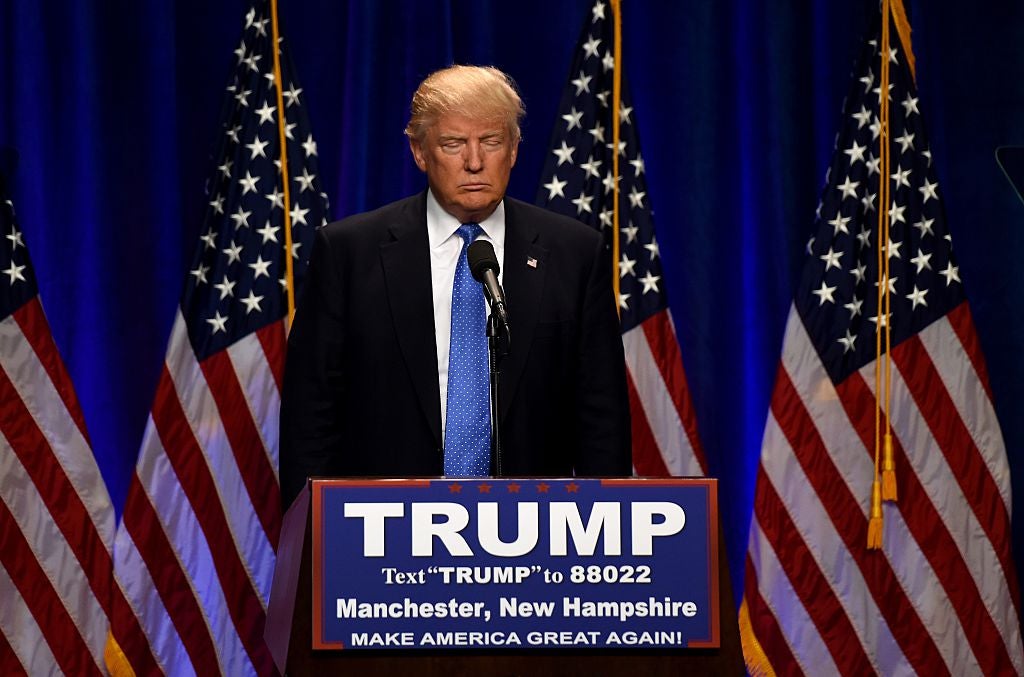Trump’s presidency means an increasingly reclusive America on the world stage – the results could disastrous
Donald Trump must settle the position of America as the leader of the free world – he has given the impression that he would rather the country was tucked away in the wings

With Donald Trump not due to move into the White House until January, there is plenty of time for speculation about his likely policy priorities. Protesters in cities across the US are already making their critical voices heard and it may be that the early part of the Trump presidency will be focused on domestic matters – not only vague box-office campaign promises such as dismantling Obamacare and building a wall along the Mexican border, but the need to convince those who didn’t support his candidacy that he is capable of being their President. That alone is a big ask.
Mr Trump’s approach to foreign policy may take even longer to become clear – and may, in fact, itself be affected by the degree to which he is able to overcome dissent at home. The overriding point which Mr Trump must settle is the position of America – and its President – as the leader of the free world. To a greater or lesser extent, that has been the United States’ accepted role on the global stage since 1941, and it has frequently played the part with gusto. Mr Trump has given the impression that he would rather America was tucked away in the wings, no longer the world’s multi-costumed policeman, peacemaker or charitable fund. A return to 1930s-style isolationism may be difficult in the age of globalisation – but of course it was rage against globalisation and all that comes with it that appears to have motivated so many of Mr Trump’s supporters. If one thing is clear from the outcome of this election, it is that the President-elect has a mandate to turn America in on itself.
In terms of trade, this would mean protectionism, closing the economic borders of the US, enforcing tariffs on goods from abroad – Mr Trump appears especially exercised by cheap imports from China. No wonder business leaders around the globe are worried: not only is it far from certain that protectionist policies would benefit the ordinary Americans who believe Mr Trump will bring jobs and prosperity; there may also be significant adverse consequences for economic growth around the world.
Yet it is in the field of international relations that Mr Trump’s attitudes will be watched most closely by foreign observers. Of most immediate concern is his outlook vis-à-vis the Middle East, and especially Syria. President Assad has already let it be known that he would be willing to cooperate with Barack Obama’s successor: no surprise, given that Mr Trump has previously given indications that he believes forcing regime change causes instability. While he is likely to maintain attacks on Isis, or other terror groups that pose a direct threat to the US, Mr Trump is unlikely to want American forces to stay embroiled in Middle Eastern conflicts for any longer than absolutely necessary.
For British and other allied forces operating in the same arena, this will pose immediate challenges. The truth is that their position is, compared with America’s might, not even second fiddle – they are barely in the same orchestra. If America pulls back from its current commitments in Syria and Iraq, as seems probable, other Western forces will be left badly exposed. The big winner, as has long been predicted, may be Vladimir Putin, for whom Mr Trump has frequently expressed admiration.
Indeed, there are two ways to look at Mr Trump’s fascination with Russia’s leader. The first is to conclude that the West’s cool relationship with Moscow has been characterised by failure and that an alternative approach may be exactly what is needed to break the ice. In this scenario, Mr Trump and Mr Putin somehow – between them – make the world a safer place. It is an optimistic notion.
The alternative conclusion is that an increasingly reclusive America will simply encourage Mr Putin to push ahead with his more expansionist flights of fancy. Victory for Mr Assad in the Syrian civil war would undoubtedly give Russia a toe-hold in the Middle East – however rubble-bound – and improved access to the Mediterranean. Emboldened, Mr Putin might wonder whether Europeans, without American backing, would rush to the aid of Ukraine in the event of a resurgence in hostilities there. And if Mr Trump turns out to be as ambivalent about Nato as some of his remarks on the subject have suggested, nervousness in the Baltic States may rise rapidly. Eight thousand miles to the east, and Japan might wonder whether it can reply on its old ally in the event of increased belligerence from China.
With Mr Trump’s election, a great many certainties about the world have been undone at a stroke. Past global interventions by America have not always proved successful, but the country’s withdrawal from world affairs could be utterly disastrous. Mr Trump may build a wall around the US – but even if they have to hold their noses, international allies should do all they can to encourage him not to shut himself inside.
Join our commenting forum
Join thought-provoking conversations, follow other Independent readers and see their replies
Comments
Bookmark popover
Removed from bookmarks